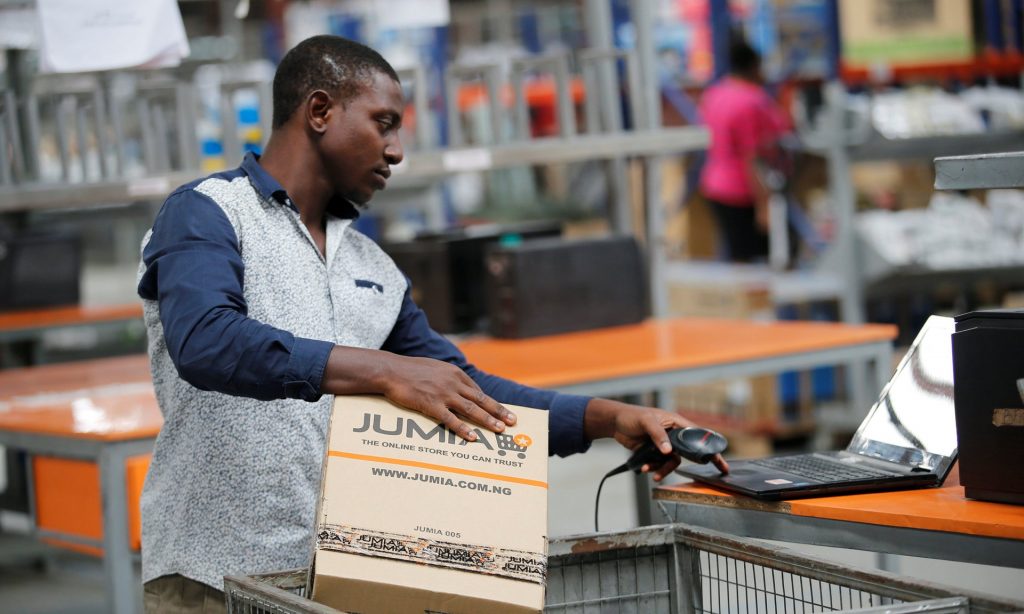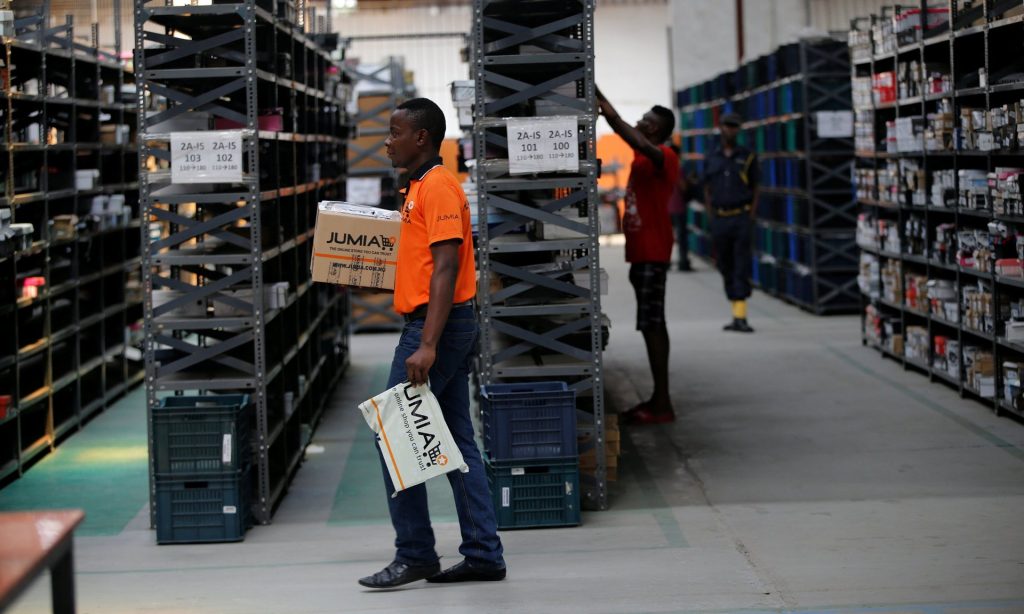
Photograph: Akintunde Akinleye/Reuters
It is a cliched image. Passengers lined up at the check-in desk for various flights back to African capitals, trolleys overloaded and suitcases straining at the weight limit.
It reflects a reality of tough customs and import regimes, complex markets and challenging distribution networks that often leave only the lucky few with the means to travel to Europe, the US, the Gulf or other destinations where they are able to buy – and take home – the consumer goods they need or want.
But this is beginning to change. The continent’s potential customer base of more than 1 billion, combined with an emerging middle class, has attracted investors to African retail.
While the vast majority of trade still occurs through informal transactions in corner shops, and to a lesser degree in shopping malls, there is a slow, steady shift from offline to online.
For Jumia Group (until recently known as Africa Internet Group), the continent’s first unicorn – a private tech startup with a valuation of over $1bn – tapping into Africa’s e-commerce potential is central to its business model.
“We sell genuine branded products to the growing middle classes in each of the markets that we serve,” said Sam Chappatte, the managing director of Jumia Kenya. “We want to provide the online shopping experience and quality products to everyone with an internet connection and disposable income.”

Photograph: Akintunde Akinleye/Reuters
The French insurer Axa paid €75m for a stake in the company in February; other investors include Goldman Sachs, South Africa’s MTN Group and Rocket Internet from Germany. Its offerings include classifieds, food delivery, travel and real estate websites – all of which have been renamed in the recent rebranding – but its online retail arm, Jumia, has been perhaps its most recognisable.
With an interface familiar to users of Amazon, Jumia acts as a marketplace for electronics, clothing, household items and more. It launched in Nigeria in 2012 and was recently named as one of the world’s top 50 smartest companies by MIT. Jumia is present in 11 countries across the continent, supplying brands and products that consumers often cannot otherwise access locally, with the added benefit of convenience.
“Ordering online saves people time and effort. There are always issues of traffic, or when you get there you find that the retailer is out of stock of the product you want. And there are still doubts around authenticity,” said Chappatte. “We have a big focus on trust. We have teams that spend their days screening the products that come on to our site.”
Jumia makes thousands of deliveries a day in Nigeria alone, and in the first nine months of 2015 recorded a transaction volume of €206m, a 265% increase on the previous year.
It is one of the largest e-commerce enterprises operating in Africa, all of which are seeking to tap into the continent’s growing consumer market.
A McKinsey Global Institute report published in 2013 suggested that e-commerce could account for 10% of retail sales – or $75bn – in Africa’s largest economies by 2025.
Elsewhere, major websites – such as Cheki in Kenya, Zimbabwe and beyond, and bidorbuy in South Africa – sell new and used cars, deliver groceries and prepared food, or offer eBay-style marketplaces. The bigger they grow, the more local entrepreneurs and small businesses can connect with a wide customer base.

Photograph: Akintunde Akinleye/Reuters
But e-commerce remains a challenging space. The absence of formal addresses in most African countries means that more time and effort is spent locating customers. A preference for cash on delivery payments in many countries – due to low credit card penetration and anxieties around fraud – leaves delivery drivers handling and carrying large sums of money. A limited pool of talent and funding also causes drag on the sector. Multiple barriers hinder the development of cross-border e-commerce – including poor infrastructure, underdeveloped logistics and difficulties with international bank transactions.
“Jumia has been very successful at fundraising and it is a real success story, but it needs to move to a sustainable business model,” said Manuel Koser, founding partner at Silvertree Capital, and who used to work with Jumia. “Is it successful in terms of return on capital? It’s so far so good with Jumia, but it’s not a finished success story.”
And, as Chappatte acknowledged, the obvious limitation to all e-commerce initiatives is “people having an internet connection”. Jumia’s response to this has been to launch its J-Force service, which works to bring off-data consumers into the online ordering space by using agents. These agents act like mini ordering and delivery hubs, earning commission in the process.
“We’re betting on a channel shift from offline to online,” said Koser, whose firm typically invests in the online and mobile sector. Despite the obstacles, with Africa’s digital divide narrowing, many agree it is a smart bet.

